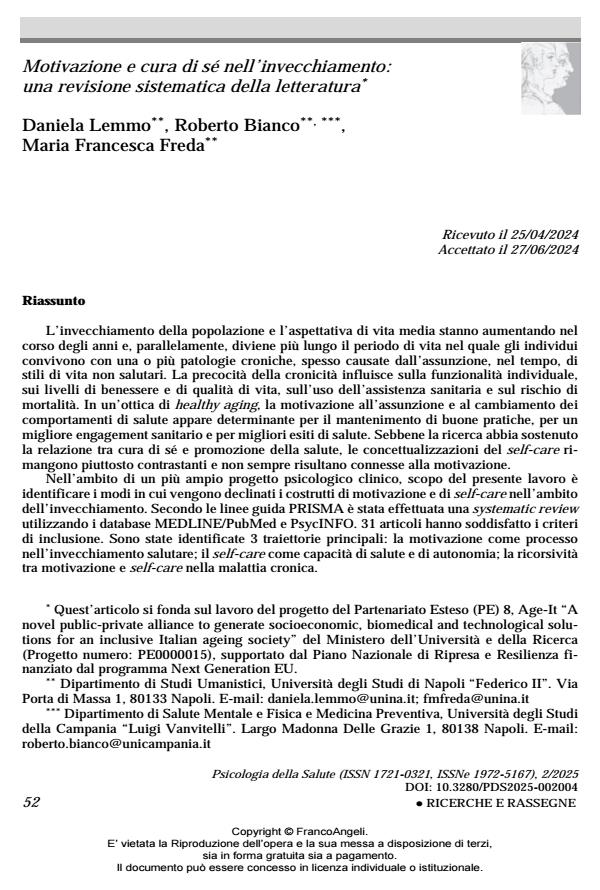Motivazione e cura di sé nell’invecchiamento: una revisione sistematica della letteratura
Titolo Rivista PSICOLOGIA DELLA SALUTE
Autori/Curatori Daniela Lemmo, Roberto Bianco, Maria Francesca Freda
Anno di pubblicazione 2025 Fascicolo 2025/2
Lingua Italiano Numero pagine 21 P. 52-72 Dimensione file 207 KB
DOI 10.3280/PDS2025-002004
Il DOI è il codice a barre della proprietà intellettuale: per saperne di più
clicca qui
Qui sotto puoi vedere in anteprima la prima pagina di questo articolo.
Se questo articolo ti interessa, lo puoi acquistare (e scaricare in formato pdf) seguendo le facili indicazioni per acquistare il download credit. Acquista Download Credits per scaricare questo Articolo in formato PDF

FrancoAngeli è membro della Publishers International Linking Association, Inc (PILA), associazione indipendente e non profit per facilitare (attraverso i servizi tecnologici implementati da CrossRef.org) l’accesso degli studiosi ai contenuti digitali nelle pubblicazioni professionali e scientifiche.
L’invecchiamento della popolazione e l’aspettativa di vita media stanno aumentando nel corso degli anni e, parallelamente, diviene più lungo il periodo di vita nel quale gli individui convivono con una o più patologie croniche, spesso causate dall’assunzione, nel tempo, di stili di vita non salutari. La precocità della cronicità influisce sulla funzionalità individuale, sui livelli di benessere e di qualità di vita, sull’uso dell’assistenza sanitaria e sul rischio di mortalità. In un’ottica di healthy aging, la motivazione all’assunzione e al cambiamento dei comportamenti di salute appare determinante per il mantenimento di buone pratiche, per un migliore engagement sanitario e per migliori esiti di salute. Sebbene la ricerca abbia sostenuto la relazione tra cura di sé e promozione della salute, le concettualizzazioni del self-care rimangono piuttosto contrastanti e non sempre risultano connesse alla motivazione. Nell’ambito di un più ampio progetto psicologico clinico, scopo del presente lavoro è identificare i modi in cui vengono declinati i costrutti di motivazione e di self-care nell’ambito dell’invecchiamento. Secondo le linee guida PRISMA è stata effettuata una systematic review utilizzando i database MEDLINE/PubMed e PsycINFO. 31 articoli hanno soddisfatto i criteri di inclusione. Sono state identificate 3 traiettorie principali: la motivazione come processo nell’invecchiamento salutare; il self-care come capacità di salute e di autonomia; la ricorsività tra motivazione e self-care nella malattia cronica. Dai risultati emerge la necessità di nuovi sforzi di ricerca per declinare concettualmente i rapporti tra i due costrutti nell’ambito dell’healthy aging, al fine di promuovere interventi motivazionali di self-care nel processo dell’invecchiamento.
Parole chiave:invecchiamento salutare, motivazione, cura di sé, cure primarie.
- Between regulatory functions and emotional burden: balancing engagement in digital health interventions for self-care in chronic illness Daniela Lemmo, Roberto Bianco, Fabrizio Mezza, Vincenzo De Luca, Maddalena Illario, Guido Iaccarino, Maria Francesca Freda, in Frontiers in Psychology 1685934/2025
DOI: 10.3389/fpsyg.2025.1685934 - Building Innovation in Ageing and Health Policy Daniela Lemmo, Fabrizio Mezza, Maria Francesca Freda, pp.145 (ISBN:978-3-032-09162-8)
Daniela Lemmo, Roberto Bianco, Maria Francesca Freda, Motivazione e cura di sé nell’invecchiamento: una revisione sistematica della letteratura in "PSICOLOGIA DELLA SALUTE" 2/2025, pp 52-72, DOI: 10.3280/PDS2025-002004